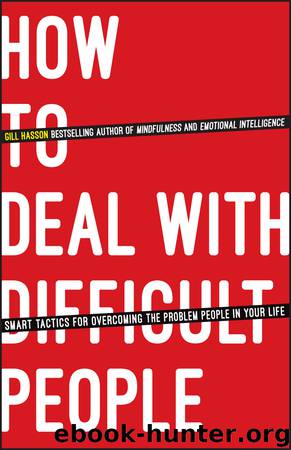How to Deal With Difficult People by Gill Hasson

Author:Gill Hasson
Language: eng
Format: mobi
ISBN: 9780857085726
Publisher: Wiley
Published: 2014-12-03T00:00:00+00:00
Part Two
Putting It Into Practice
Chapter 5
Dealing With Direct Hostility
Who doesn't encounter difficult, hostile people every now and again? Whether it's someone in your family, at work or out in public, openly hostile people are confrontational, obnoxious and intimidating. An encounter with an openly hostile person can leave you feeling upset, powerless and angry.
People usually behave in this way for one of two reasons: to dominate, control and get what they want (instrumental aggression) or as a reaction, a response to something that has or hasn't happened to them (impulsive aggression).
When someone uses instrumental aggression, it's because they've learnt that by being difficult they can get whatever they want from another person. For them, their disagreeable ways – their aggression and hostility – are nothing more than a means to serve their ends. Yet, to you, their aggression is a weapon that leaves you feeling hurt, confused, perhaps even bullied.
When someone uses impulsive aggression it's usually as a result of an unmet expectation or need, and they now feel wronged or let down. Sometimes their anger may build; other times something suddenly happens which makes them angry, even enraged.
Whether someone is using instrumental aggression or is impulsively aggressive (the situations in this chapter are examples of both), it can be difficult to manage your own feelings. There are, though, ways to avoid reacting emotionally to someone else's hostility; you'll need to use listening skills and take an assertive approach.
You can choose whether to let the hostile person dictate to you what is going to be done. You can choose whether to engage. You can walk away at any point in the confrontation with a hostile person.
It's helpful to remind yourself whose problem this really is: the hostile person's, not yours. Only take responsibility for your own actions. You are not responsible for anyone else's behaviour or for the emotions someone else is feeling. You are not to blame if they choose to be angry or upset with you, someone or something else. They need to manage their own feelings and reactions.
With aggressive people you must send a clear signal that you are strong and capable – anything less is an invitation for further attacks.
You can, however, help or exacerbate the situation according to your responses.
If you step out boldly, you send out a quite different message, one of confidence.
Remember to use assertive body language; you may not be feeling very confident but you'll certainly look it. Remind yourself to use just two or three confident actions:
Download
This site does not store any files on its server. We only index and link to content provided by other sites. Please contact the content providers to delete copyright contents if any and email us, we'll remove relevant links or contents immediately.
| Conflict Resolution & Mediation | Human Resources & Personnel Management |
| Knowledge Capital | Outsourcing |
Bullshit Jobs by David Graeber(4190)
Radical Candor by Kim Scott(2723)
I Am Right, You Are Wrong by Edward De Bono(2441)
23:27 by H. L. Roberts(2249)
Nomadland by Jessica Bruder(2063)
Average Is Over by Tyler Cowen(1848)
The Conflict Resolution Phrase Book by Barbara Mitchell & Cornelia Gamlem(1779)
Out of Our Minds: Learning to Be Creative by Ken Robinson(1745)
High-Impact Interview Questions by Victoria A. Hoevemeyer(1691)
Who Moved My Cheese?: An Amazing Way to Deal With Change in Your Work and in Your Life by Johnson Spencer(1648)
An Everyone Culture: Becoming a Deliberately Developmental Organization by Robert Kegan & Lisa Laskow Lahey(1644)
The Ideal Team Player by Patrick M. Lencioni(1642)
The Asshole Survival Guide by Robert I. Sutton(1598)
Automatic Society by Bernard Stiegler(1556)
Unleashed by Anne Morriss & Frances Frei(1540)
Who by Street Randy & Smart Geoff(1506)
42 Rules of Employee Engagement by Susan Stamm(1477)
96 Great Interview Questions to Ask Before You Hire by Paul Falcone(1452)
Fish! by Stephen C. Lundin(1405)
